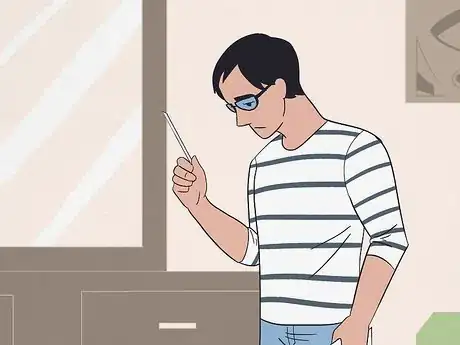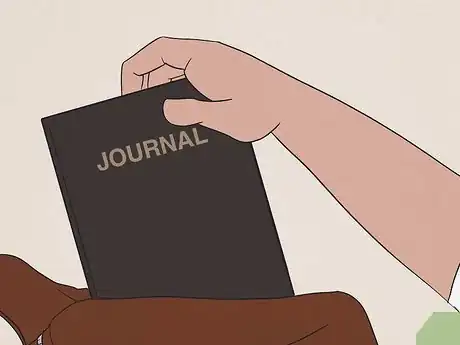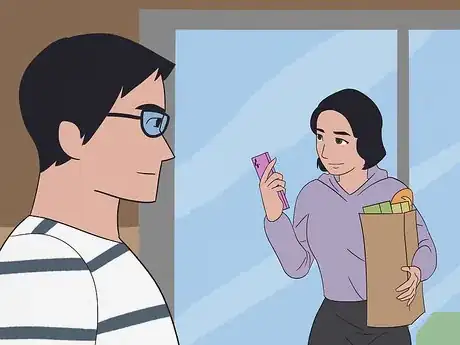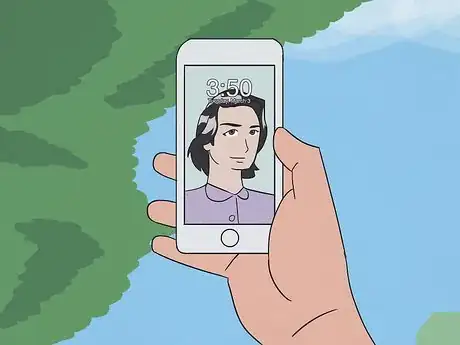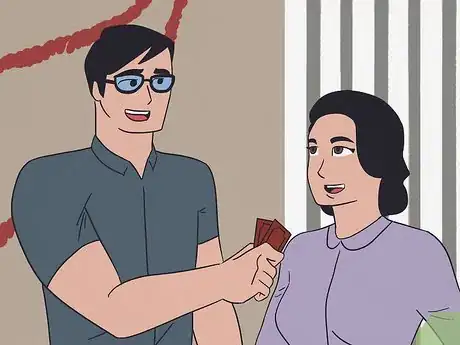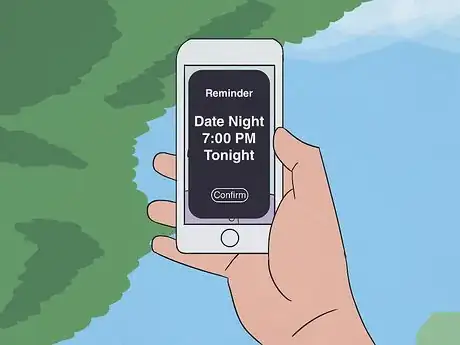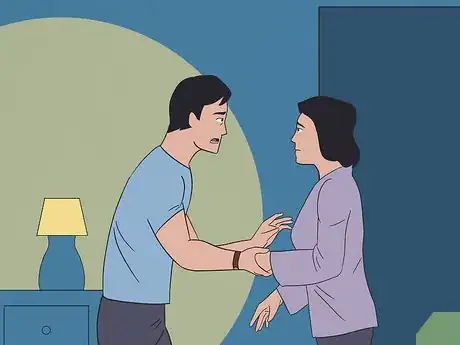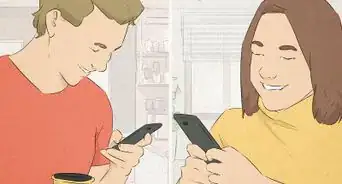This article was co-authored by Lauren Urban, LCSW and by wikiHow staff writer, Danielle Blinka, MA, MPA. Lauren Urban is a licensed psychotherapist in Brooklyn, New York, with over 13 years of therapy experience working with children, families, couples, and individuals. She received her Masters in Social Work from Hunter College in 2006, and specializes in working with the LGBTQIA community and with clients in recovery or considering recovery for drug and alcohol use.
This article has been viewed 19,386 times.
When you’re emotionally unavailable, it’s really hard to have a long-term relationship, which can be frustrating. You may have deep feelings for someone, but it might still be hard to open up to them. Fortunately, you can make changes to help you become emotionally available. Start by confronting the reasons that are causing you to pull away. Then, change the way that you approach relationships so you can connect with someone. Once you’re in a relationship, focus on your partner, open up to them, and let intimacy develop slowly.
Steps
-
1Figure out why you’re emotionally unavailable. The reason you’re emotionally unavailable will be rooted in your past or your current priorities. Additionally, it will be temporary or chronic, depending on what’s causing it. Think about your past and what’s going on right now to help you figure out why you have trouble being intimate in relationships. Here are the common causes of emotional unavailability:[1]
- Mental illness that makes it hard to connect with someone right now, such as feeling depressed.
- An alternative priority like a family obligation, a work or personal goal, an educational goal, or a health issue.
- A recent ending to a long-term relationship.
- Past hurt from a close personal relationship or prior romantic relationship.
-
2Identify what scares you about commitment or emotional intimacy. You may find that it’s hard to get close to people, and you may even unintentionally sabotage your relationships. This can be frustrating, but it’s not your fault. You’re likely afraid of being hurt because of something that happened in your past. Reflect on your prior relationships with family, friends, and romantic partners to figure out why you’re afraid.[2]
- For example, if your parent regularly broke promises they made to you, it might be hard for you to trust other people. This naturally makes you pull away.
- Similarly, if you’ve had several partners cheat on you, you might expect your future partners to do the same. This makes you want to protect yourself by not getting close to them.
Advertisement -
3Use journaling to help you work through your feelings. When you’re emotionally unavailable, it’s really hard to open up to other people. If this is the case for you, write about your feelings in a journal. Explain what happened in your past, how it’s affecting you, and what you hope to change.[3]
- Keep your journal in a safe place so that others won’t read it.
- Try to write at least 3-4 times a week.
-
4Develop coping skills to help you deal with your emotions. It’s normal to struggle with managing your emotions when you’re emotionally unavailable. You might find that you expect your partner to be responsible for your feelings or you get angry a lot. This can be scary to recognize in yourself, but it’s a natural reaction that you can change by learning coping skills. Here are some coping skills to try:[4]
- Use positive self-talk.
- Express your creativity.
- Go for a run or walk.
- Color in an adult coloring book.
- Play with your pet.
- Write in a journal.
- Talk to someone.
-
5Seek out new experiences to help you grow as a person. Being open to new experiences helps you be more flexible and open to change. This can help you change the habits that are making you emotionally unavailable. Make a list of things you’d like to try, like activities, interests, restaurants, or hobbies. Then, try to check off 1 thing each week.[5]
- For example, try a new cuisine, take a class to learn a new skill, or take a different route home from work or school.
Did You Know? Emotional unavailability protects you from getting hurt by allowing you to stay in control and keeping your life predictable. By opening yourself up to something new and different, you can show yourself that change is good!
-
6Talk to a therapist if you need help opening yourself up to others. It may be hard for you to become emotionally available on your own, and that’s okay. A therapist can help you work through your past and learn new ways to cope with your emotions. Additionally, they’ll teach you how to change your thoughts and behaviors. Ask your doctor for a referral to a therapist or look for one online.[6]
- Your therapy appointments might be covered by insurance, so check your benefits.
Changing How You Approach Relationships
-
1Accept that you can only control your own actions and reactions. It’s scary opening up to someone else, and feeling in control might help you deal with that fear. However, it also prevents you from forming an intimate relationship with someone. Focus on what’s within your control, like your behavior and how you deal with things. However, don’t try to control your partner or the path of your relationship.[7]
- For example, you might try to control what you and your partner talk about by shutting down conversations or ignoring them when they bring up something you don’t want to discuss. Instead of trying to control the topic of conversation, focus on controlling your reaction. You might use positive self-talk to keep your cool.
- You might say to yourself, "I'm strong enough to deal with this, so I'm not going to get upset. I can't control what they say, but I can control how I react."
-
2Look for positive qualities in potential partners instead of imperfections. When you’re emotionally unavailable, it’s common to search for a flaw in every potential partner so you have a reason to push them away. This hurts you and is unfair to them, but you can change this pattern. Turn things around by focusing on their positive traits. Make a point to see the best in people you date so you’ll be less focused on their flaws.[8]
- No one is perfect, so you’re always going to notice flaws in people. For instance, they might talk too much or could be a little messy. Try to look past these flaws to see their good traits.
- If someone does something that’s a deal breaker for you, it’s okay to break things off with them. For example, if their flaw is that they’re unkind to animals, you might decide to end the relationship.
-
3Talk to potential partners about your need for mutual independence. Your emotional unavailability likely makes you very independent and self-reliant, which is a good thing. It’s common for people who are emotionally unavailable to be afraid of losing their independence, so you might pull away when relationships get serious. Instead, tell potential partners that you expect each of you to maintain your independence while you’re together.[9]
- For example, you might both maintain relationships with your friends, schedule activities without each other, and continue to spend time on your hobbies and personal goals.
Tip: In a healthy relationship, both partners enjoy their independence and have space to pursue their individual goals. You don’t need to give up who you are to be emotionally intimate with someone.
-
4Set boundaries for what you want and don’t want in a relationship. Boundaries are your expectations for what you want in a relationship, and they help your partner understand how you want to be treated. Decide what you want and expect from your partner, then communicate this to your potential partners. Explain that you won’t continue the relationship if they violate your boundaries.[10]
- For instance, your boundaries might be that you won’t tolerate cheating, you want at least one night to yourself every week, and you don’t want to move in together in the next year.
-
5Take things slow so you don’t feel overwhelmed with expectations. Getting into a relationship can be stressful when you’re emotionally unavailable because you likely feel that your partner expects a lot from you. This can make you feel overwhelmed, which triggers you to pull away more. Give yourself time to open up to people by taking things slow. Here are some things to consider:[11]
- Tell them directly that you want to take things slow. Say, “It’s important to me that we take things slow so this can develop into a healthy relationship.”
- Don’t rush to the next phase of your relationship. For instance, don’t have sex too early.
- Don’t tell them you're in love until you’re ready. If they say "I love you" first, give them a hug and say something like, "You're really important to me. I'm not quite ready to label my feelings yet, but I'm happy we're growing closer."
Building a Healthy Relationship
-
1Focus on your relationship instead of keeping your options open. It’s common for people who are emotionally unavailable to have a plan for when a relationship falls apart, which might include other potential partners. This helps you feel protected and in control, but it hurts you in the long-run. Stop thinking about what will happen if your relationship ends and instead focus on making it work.[12]
- For example, don’t keep your dating profile open in case someone better comes along. Similarly, don’t flirt with other people so you have options for when your relationship ends.
- Having a back-up plan undermines your current relationship and makes it hard for you to connect with your partner.
-
2Initiate plans and conversations with your partner. When you’re emotionally unavailable, you often rely on your partner to initiate things. That’s because you feel less vulnerable if you don’t have to put yourself out there. To help you change this, start being the first to text or call them. Additionally, plan a nice date for them or suggest some plans.[13]
- For example, text them “Good morning” or ask how they’re doing after the work day ends.
- If they plan a date, make a point to plan the next one. Say, “Thanks for suggesting we play mini golf tonight. Why don’t we go bowling next Friday?”
-
3Schedule quality time with your partner to deepen your connection. Right now you might have another priority that’s drawing you away from your partner. However, you need to spend more quality time with them if you want to become more emotionally available. Arrange time that you can spend together at least once a week. Make it a priority to keep this date with them.[14]
- For example, you might make Saturday your standing date night.
- It’s best to see your partner more than once a week. However, it might be hard to do that when you’re used to pulling away. It’s okay if you can only do once a week right now.
Tip: If you have a long distance relationship, do a video chat at least once a week to spend time with your partner.
-
4Open up to your partner about your inner thoughts and feelings. Intimacy begins when you open up to someone. Start by telling them how you feel in the moment and why. Then, share a secret that you haven’t told anyone. Reveal more and more about yourself as your relationship continues.[15]
- For instance, say, “I feel really stressed right now because I have a work deadline coming up.”
- Later, you might say, “When I was a child, I was really afraid of dogs after a loose dog bit me.”
- Eventually, you could open up about something that scares you or a personal goal that you’re working on.
-
5Avoid criticizing or arguing with your partner when you’re upset. You might have a tendency to start an argument or get critical when you feel vulnerable. For instance, if your partner asks you too many personal questions, you might get defensive so they’ll stop. If you find yourself doing this, take a few moments to calm yourself down. Then, try to talk to them about what you’re feeling.[16]
- Say, “I really care about you, but right now I’m feeling overwhelmed. Can we slow things down for a minute?”
Expert Q&A
-
QuestionWhat does it mean to be emotionally available?
 Lauren Urban, LCSWLauren Urban is a licensed psychotherapist in Brooklyn, New York, with over 13 years of therapy experience working with children, families, couples, and individuals. She received her Masters in Social Work from Hunter College in 2006, and specializes in working with the LGBTQIA community and with clients in recovery or considering recovery for drug and alcohol use.
Lauren Urban, LCSWLauren Urban is a licensed psychotherapist in Brooklyn, New York, with over 13 years of therapy experience working with children, families, couples, and individuals. She received her Masters in Social Work from Hunter College in 2006, and specializes in working with the LGBTQIA community and with clients in recovery or considering recovery for drug and alcohol use.
Licensed Psychotherapist It means that you're present and open with your partner! That's the easiest way to think about it. Work at your relationship, be open about your feelings, and process your emotions as they come to you.
It means that you're present and open with your partner! That's the easiest way to think about it. Work at your relationship, be open about your feelings, and process your emotions as they come to you. -
QuestionHow do you treat emotional unavailability?
 Lauren Urban, LCSWLauren Urban is a licensed psychotherapist in Brooklyn, New York, with over 13 years of therapy experience working with children, families, couples, and individuals. She received her Masters in Social Work from Hunter College in 2006, and specializes in working with the LGBTQIA community and with clients in recovery or considering recovery for drug and alcohol use.
Lauren Urban, LCSWLauren Urban is a licensed psychotherapist in Brooklyn, New York, with over 13 years of therapy experience working with children, families, couples, and individuals. She received her Masters in Social Work from Hunter College in 2006, and specializes in working with the LGBTQIA community and with clients in recovery or considering recovery for drug and alcohol use.
Licensed Psychotherapist Work with a therapist to identify why you're emotionally unavailable. They can help you examine your past and learn new coping skills. Additionally, they'll help you change your thoughts and behaviors.
Work with a therapist to identify why you're emotionally unavailable. They can help you examine your past and learn new coping skills. Additionally, they'll help you change your thoughts and behaviors.
Warnings
- It’s often difficult to change on your own. If you’re having trouble opening up to others, work with a therapist who can help you learn to open up and connect with someone.[18]⧼thumbs_response⧽
References
- ↑ https://www.psychologytoday.com/us/blog/toxic-relationships/201803/10-signs-emotionally-unavailable-partner
- ↑ https://www.hercampus.com/sex-relationships/relationships/5-ways-stop-being-emotionally-unavailable
- ↑ https://www.psychologytoday.com/us/blog/toxic-relationships/201803/10-signs-emotionally-unavailable-partner
- ↑ https://goodmenproject.com/featured-content/how-do-men-become-more-emotionally-available-dg/
- ↑ https://goodmenproject.com/featured-content/how-do-men-become-more-emotionally-available-dg/
- ↑ Lauren Urban, LCSW. Licensed Psychotherapist. Expert Interview. 3 September 2018.
- ↑ https://goodmenproject.com/featured-content/how-do-men-become-more-emotionally-available-dg/
- ↑ https://www.psychologytoday.com/us/blog/toxic-relationships/201803/10-signs-emotionally-unavailable-partner
- ↑ https://www.psychologytoday.com/us/blog/toxic-relationships/201803/10-signs-emotionally-unavailable-partner
- ↑ https://www.hercampus.com/sex-relationships/relationships/5-ways-stop-being-emotionally-unavailable
- ↑ https://www.psychologytoday.com/us/blog/toxic-relationships/201803/10-signs-emotionally-unavailable-partner
- ↑ https://www.psychologytoday.com/us/blog/toxic-relationships/201803/10-signs-emotionally-unavailable-partner
- ↑ https://www.oprahmag.com/life/relationships-love/a27899292/signs-emotionally-unavailable-partner/
- ↑ https://www.psychologytoday.com/us/blog/toxic-relationships/201803/10-signs-emotionally-unavailable-partner
- ↑ https://www.hercampus.com/sex-relationships/relationships/5-ways-stop-being-emotionally-unavailable
- ↑ https://www.psychologytoday.com/us/blog/toxic-relationships/201803/10-signs-emotionally-unavailable-partner
- ↑ https://www.psychologytoday.com/us/blog/toxic-relationships/201803/10-signs-emotionally-unavailable-partner
- ↑ https://www.psychologytoday.com/us/blog/toxic-relationships/201803/10-signs-emotionally-unavailable-partner

